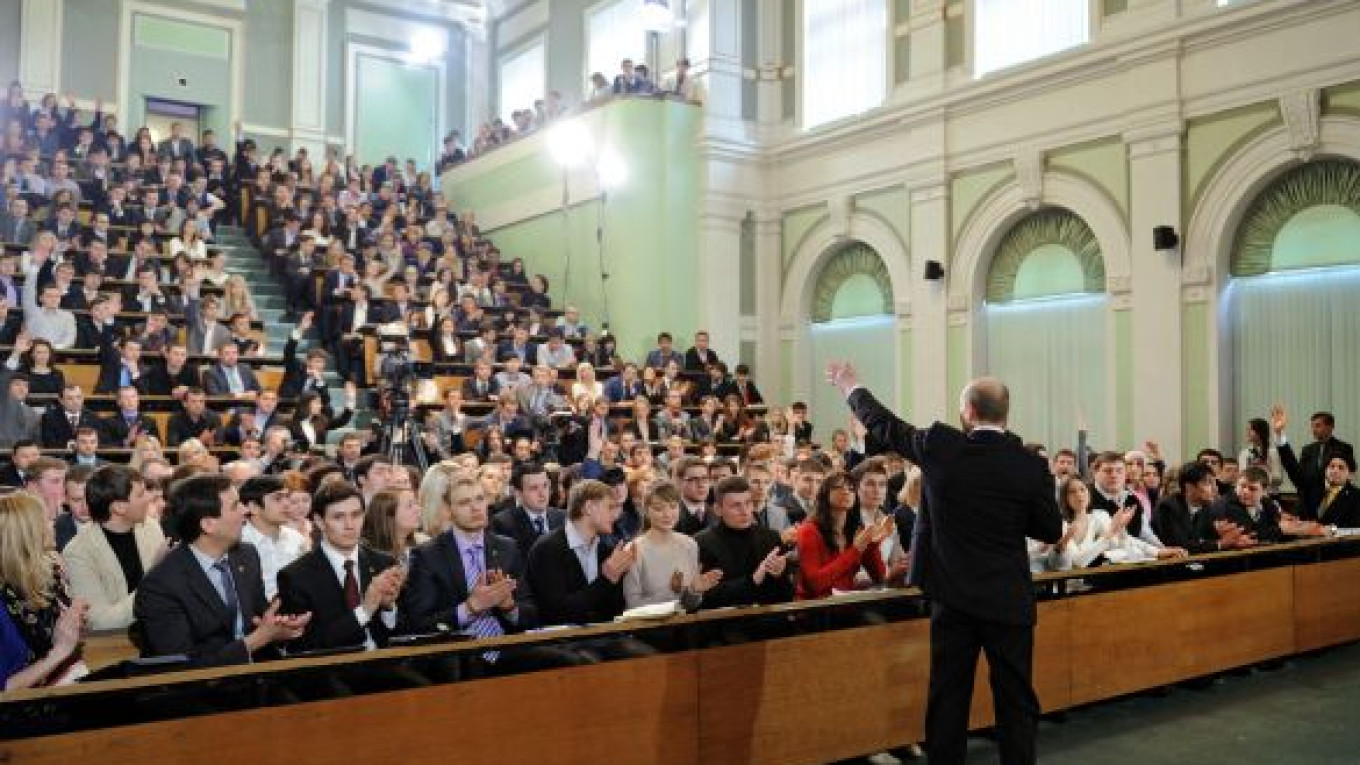Prime Minister and leading presidential candidate Vladimir Putin acknowledged for the first time Wednesday that he might face a runoff in the March election but warned that it might result in the “destabilization” of the country.
“There is nothing horrible” about a runoff, Putin said, telling a group of young lawyers in televised remarks that he was ready for it.
According to the state-run polling group VTsIOM, Putin has about 50 percent support among voters, far more than any other registered candidate. But some observers and politicians say a runoff scenario is distinctly possible due to the energized opposition movement.
But Putin said a second round would lead to a “certain destabilization of the political situation,” reiterating his main campaign argument about why voters should send him back to the presidency for a third time.
In December, tens of thousands of people gathered to protest against alleged fraud in the State Duma election, but the focus soon turned to anti-Putin slogans and chants. Another mass demonstration — the third of its kind — is scheduled for Saturday.
The anti-Putin mood reached fever pitch Wednesday when activists with the opposition Solidarity movement unfurled a banner across from the Kremlin with Putin’s face crossed out over a slogan reading, “Putin Go Away.” Police quickly removed the banner.
“We think 12 years under Putin’s rule is more than enough,” Pavel Yelizarov, a Solidarity activist who stood on a nearby embankment told Reuters.
Putin officially had taken the day off, but spent it meeting with the Association of Lawyers in Moscow and visiting their center from which they will monitor the March election, the RBK Daily newspaper reported.
While answering their questions, Putin said he was ready to give election observers affiliated with Grigory Yavlinsky’s opposition Yabloko party an opportunity to monitor the polls.
Yavlinsky was refused registration for the election and his supporters claim it was partly because authorities wanted to bar Yabloko’s strong team of thousands of observers from polling stations.
Yabloko Party leader, Sergei Mitrokhin, wrote on Twitter that the party would agree only if Putin implemented protesters’ demands by dismissing Central Elections Commission chairman Vladimir Churov.
Putin mentioned Wednesday that he doesn’t use the Internet, particularly Twitter and other social networks because he’s too busy working.
In another gesture, Putin said he was ready to invite people from opposition parties — including Yabloko and Right Cause — to join the government.
“I don’t see anything impossible here,” Putin said in televised remarks carried by Channel One in a 10-minute long report.
A senior Communist Party member and State Duma deputy, Ivan Melnikov, dismissed Putin’s statement as a “pre-election trick,” Interfax reported.
The presidential election is scheduled for March 4, and Putin is expected to win. He faces Gennady Zyuganov of the Communist Party, Vladimir Zhirinovsky of the Liberal Democratic Party, Sergei Mironov of A Just Russia and businessman Mikhail Prokhorov, who is running as an independent.
Putin announced in September that he would attempt to return to the presidency after four years as Prime Minister, in a planned job swap with Dmitry Medvedev.
On Wednesday, Putin said he “never wanted to take part in the elections.”
“It has always seemed to me that it’s a hard procedure, a very disgusting one,” he added.
Late Tuesday, the United States’ Director of National Intelligence James Clapper released a report saying if Putin is re-elected, he “is most likely to preserve the political and economic system rather than be an agent of reform or liberalization.” Putin’s presidency “is likely to mean more continuity than change in Russian domestic politics and foreign policy, at least during the next year,” Clapper said. As for foreign policy, Putin might harden the “reset” process with the United States because of an “instinctive distrust of U.S. intentions,” the report said.
A Message from The Moscow Times:
Dear readers,
We are facing unprecedented challenges. Russia's Prosecutor General's Office has designated The Moscow Times as an "undesirable" organization, criminalizing our work and putting our staff at risk of prosecution. This follows our earlier unjust labeling as a "foreign agent."
These actions are direct attempts to silence independent journalism in Russia. The authorities claim our work "discredits the decisions of the Russian leadership." We see things differently: we strive to provide accurate, unbiased reporting on Russia.
We, the journalists of The Moscow Times, refuse to be silenced. But to continue our work, we need your help.
Your support, no matter how small, makes a world of difference. If you can, please support us monthly starting from just $2. It's quick to set up, and every contribution makes a significant impact.
By supporting The Moscow Times, you're defending open, independent journalism in the face of repression. Thank you for standing with us.
Remind me later.


